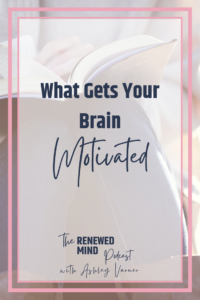I’ve shared before that our brains are wired for survival.
Scientist call it the Motivational Triad. And it says that our actions are motivated by three survival instincts: seeking pleasure, avoiding pain, and conserving energy.
Why does that matter? And what does it have to do with our spiritual walks and renewing our mind? Well, today, we’re going to find out!
Resources Mentioned:
The Mindset Reset: https://ashleyvarner.com/mindset
Get Ashley’s ground breaking program The Mindset Reset. It is a self-paced program made to guide you to taking your thoughts captive and finally control your emotions, so they stop controlling you!
Highlights from the Episode:
How Our Brains Work
The part of our brain that is wired for survival: The limbic system, which focuses on The Motivational Triad.
- To seek out pleasure, desires, happiness, and comfort. (Positive things that keep us alive: foods, social relationships, reproduction, acceptance and recognition) (negative : over shopping, drugs and alcohol)
- To avoid pain. (physical and mental). Positive, it protects us. We want to avoid pain so we don’t touch the hot stove. But it can also be negative: when we’re trying to stop eating sugar)
- To conserve energy and seek efficiency. (The path of least resistance to achieve numbers 1 and 2). Positive: when your brain goes into autopilot when you drive a car. Negative: when you need to fold laundry and just want to sit and relax.
God designed this part of our brain (which is called the limbic system) to keep us alive and protect us.
You may have heard of the fight or flight. But it can also work against us. It can make us overly cautious, lazy, and motivated by comfort and pleasure only.
Thankfully, God also designed another part of our brain – called our prefrontal cortex. This is the part of the brain that uses logic, reason, and gives us the ability to make different choices than just surviving on instinct.
This is where our attention and motivation are, this is what allows us to control our impulses and ignore distractions. It’s also where we create and execute plans, organize actions in a sequence (like following a receipt), are able to switch between tasks, and adapt to changes in rules.

So why does this matter and how does this affect our spiritual life
When we understand the way God made our minds, we can see thoughts for what they really are and where they come from.
If you’re trying to get your house clean and your mind keeps thinking it would be better to just sit and watch TV, you can realize that those come from the limbic part of the brain and consciously change those thoughts using your prefrontal cortex.
I know this is a lot of science-y stuff, but it helps to know the way God made our minds, so when these thoughts come up, we understand why we need to overcome them.
This is also why sin seems so easy while following Jesus seems so hard.
Sin appeals to our desires and pleasure seeking thoughts. Following Jesus appeals to our prefrontal cortex. We realize that what might feel good in the moment (I don’t just mean physically pleasurable, but also things like telling off the clerk for messing up your drive thru order, or staying on the couch
when you know you should get some chores done), those things might feel good in the moment, but with the mature part of our brains, we can see what’s really good for us in the long run.
Jesus asks us to choose between these two parts of us when he said in Matthew 16:24 “Deny yourself, take up your cross, and follow me.”
He’s saying, “I know it’s going to go against everything that feels good, it takes effort, and it will even hurt sometimes, but trust me enough to follow me.”

How to Use This information about the brain to get motivated for change
As we pay attention to our thoughts, we can start to see where they come from. Are they coming from the more primal limbic system part of the brain?
Or the reasoning side of the prefrontal cortex?
Just knowing that fact can help us make our decisions.
Another thing to keep in mind is that the prefrontal cortex can make decisions ahead of time, while the limbic system is more of an instinctual decision.
We’re going to talk about dealing with temptation (which by the way is just thoughts) in a few weeks and we’ll touch on this again, but making a plan ahead of time from your prefrontal cortex and can get you motivated for change and finally say no to temptation.